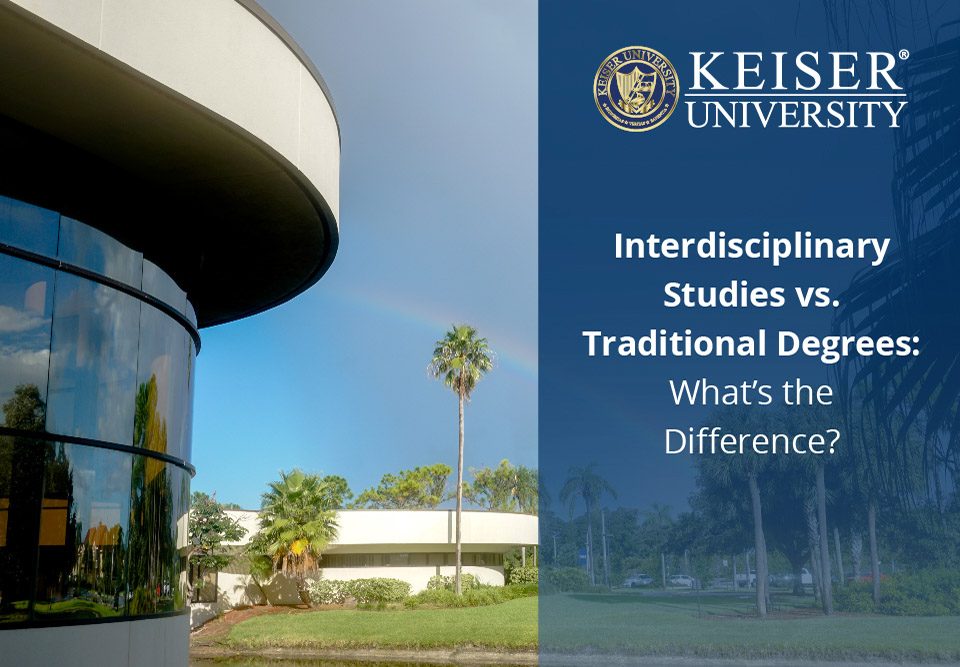Many college students feel pressure to have a distinct idea of which academic field they want to focus on and what type of career they want in the future. However, the fact of the matter is that you do not need to know precisely who you want to be or what you want to do by the time you enroll in your undergraduate or graduate degree program.
Students who are still considering multiple academic pathways could benefit from an interdisciplinary studies degree program. Understanding a general studies degree vs. interdisciplinary studies can help you determine which educational structure is right for you.
Defining Interdisciplinary Studies and Traditional Degrees
Before you begin deciding between an interdisciplinary study vs. regular degree program, it is ideal to have a comprehensive understanding of what each program type entails. While both degree programs equip you with advanced knowledge and skills that prepare you for the workforce, the focus and scope vary significantly.
Overview of Interdisciplinary Studies
Interdisciplinary studies are academic degree programs focused on a broad range of topics — providing students with an opportunity to make connections across multiple fields while honing their creative and critical thinking skills. According to research published in the CBE — Life Sciences Education academic journal, interdisciplinary studies prepare students for completing advanced research that covers multiple academic disciplines. In recent years, demand has increased for professionals with a background in interdisciplinary studies due to their unique ability to recognize connections and solve complex problems with innovative solutions.
Characteristics of Traditional Degrees
Traditional degree programs have long been the most common and popular option among college students because they are designed to equip students with the specific knowledge and skills needed to begin a career in one particular field. For instance, a student who wants to become a teacher may pursue a degree in education, while an individual interested in a career in finance may earn a business degree. According to Indeed, a traditional degree program offers coursework related to a particular subject area, allowing students to develop an advanced understanding of their chosen field. The curriculum for these traditional degrees may also require students to complete an internship or professional training in their area of study.
Key Differences Between Interdisciplinary and Traditional Degrees
There are several key distinctions between interdisciplinary and traditional degrees of which students should be aware before enrolling in a degree program. The primary differences between interdisciplinary study vs. a regular degree are:
Flexibility in Interdisciplinary Programs
Interdisciplinary programs offer a greater sense of flexibility along with an opportunity to explore a wide range of subject areas as students discover their strengths and interests within the various fields. There is more freedom to choose courses that align with your interests, giving you the ability to personalize your degree program and carve out an individual career path.
Focused Approach in Traditional Degrees
A traditional degree offers a more focused approach to academic study, with a strict outline of courses that must be completed in order to graduate. Though there is less flexibility within the curriculum, a traditional degree program allows you to explore advanced topics within your chosen field of study and develop the skills necessary to launch your career in a specific field.
Skill Development and Applications
Within both degree programs, you build upon a range of practical, technical and soft skills that can be applied in your personal and professional life. While a traditional degree program may focus more on industry-specific competencies, an interdisciplinary studies degree allows you to hone your research skills while improving your communication, creativity and critical thinking skills.
Benefits of Interdisciplinary Studies
At one time, aspiring professionals needed to develop advanced, technical skills to prepare themselves for their chosen career field. Today, however, due to advancing technology, organizations across all industries are seeking individuals who can think creatively and resolve problems with innovative ideas — underscoring the power of an interdisciplinary studies degree.
According to the American Council of Trustees and Alumni, the following are some of the most notable benefits of earning an interdisciplinary studies degree:
Cross-Disciplinary Skill Building
Interdisciplinary studies degrees focus heavily on making connections across academic disciplines, revealing how different information can be applied in various settings. These degree programs provide students with a unique opportunity to hone their cross-disciplinary skills — an aspect that is lacking in most traditional degree programs focused on a singular academic area.
Adaptability in Evolving Job Markets
Gone are the days when students would graduate from college, get a job at a company and spend the duration of their career there. Today’s evolving job market drives most professionals to ebb and flow from different organizations and across various fields. An interdisciplinary studies degree allows students to become more adaptable and agile, preparing them for an ever-changing professional landscape.
Tailored Academic Experience
Within an interdisciplinary studies degree, students have the opportunity to align their experience with their academic goals. They have more flexibility and freedom to choose coursework that interests them and, in turn, the ability to enjoy a specialized education. It’s an opportunity to make yourself more marketable while ensuring you stay on track for your future career goals.
Advantages of Traditional Degrees
Of course, there are still plenty of advantages associated with traditional degrees to consider as students finalize their college decisions. Benefits of pursuing a traditional degree program in a specific field include:
Depth of Knowledge in a Single Discipline
Traditional degree programs offer a more focused and in-depth curriculum that helps students develop expertise in a single discipline. Additionally, these programs focus on the skills required within a career field, effectively preparing students for the competitive job market they will face after graduation.
Established Pathways to Careers
Traditional degree programs are designed to provide students with a clear pathway toward a particular career field — making them an ideal option for those who know what they want to do in their professional lives post-graduation.
Industry Recognition and Value
Many fields prioritize traditional degree programs and other industry-recognized credentials in job candidates. So, for those with a clear idea of their career aspirations, a subject-specific degree could be the best way to showcase your commitment to a given specialty.
Career Opportunities and Market Trends
Any type of college degree program can open doors to new career opportunities for recent graduates. Whether you choose an interdisciplinary studies degree or a traditional degree program, you can apply your newfound skills and knowledge in a rewarding way.
How Interdisciplinary Skills Apply to Emerging Industries
Interdisciplinary studies degree programs allow students to learn more about how multiple fields are connected to one another as well as develop key interdisciplinary skills — such as analytical thinking, cross-disciplinary research and active learning. Interdisciplinary skills are highly valued among employers looking to hire forward-thinking leaders who have an ability to solve complex problems.
Traditional Careers With Clear Progression Paths
Students interested in pursuing traditional careers with clear progression plans may still benefit from a traditional degree; however, they will have to actively work to hone their interdisciplinary skills. Many employers are finding it more difficult to discover and hire graduates with the soft skills they need, further emphasizing the importance of interdisciplinary skills in today’s job market.
Employer Preferences and Market Trends
According to Inside Higher Ed, an overwhelming number of employers still prefer to hire college graduates. About 81% of employers report that college degrees are a valuable investment for students. In addition, 86% prefer to hire graduates who have been exposed to a vast range of topics and viewpoints.
Choosing the Right Path for You
At the end of the day, you will need to consider the difference between individualized and interdisciplinary studies in order to determine which option is best for both your personal and professional goals.
Evaluating Long-Term Benefits
Think beyond your degree program and its required curriculum to consider the long-term benefits of investing in your education. Ponder your professional goals and the career trajectory you want to enjoy for the next 20 or 30 years before deciding on a degree program.
Personal Interests and Career Objectives
You should choose a degree program that allows you to leverage your strengths and explore your interests and passions while simultaneously developing the skills required for your chosen career.
Industry Requirements and Expectations
If you know which type of career you want to pursue, it is essential to think about the industry requirements and standards within that field. It is crucial for you to research job qualifications specific to the degree program selected. Not every industry aligns with an interdisciplinary studies degree, so understanding these requirements ensures you’re on track for your career goals. What degree program you select is an opportunity to enhance your marketability and ensures you to gain applicable experience and you’re prepared for your future career path.
Professional and Career Development
Your degree program provides a foundation upon which you can build throughout your career. As you select a degree program, consider the type of professional development programs that you can pursue in the future to advance your skills and remain relevant in the workforce.
Future Trends in Higher Education
Emerging trends in higher education show that students are looking for a more personalized experience — and that employers prefer graduates who have a wide range of interdisciplinary skills. Keep in mind a few future trends in higher education as you consider a traditional vs. modern education.
Rise of Interdisciplinary Programs
According to Issues in Science and Technology, an increasing number of universities are offering interdisciplinary studies programs, or they are weaving interdisciplinary studies into their traditional curriculum programs. Research suggests that some traditional degree programs have become too focused, urging colleges and universities to rethink their approach to education.
Integration of Traditional and Modern Learning Approaches
Many colleges and universities are finding ways to blend traditional curriculum programs with modern learning approaches. For instance, students in science-based degree programs are taking more classes in the arts, while medical students are focusing on communication skill development. Online degrees are also becoming a more prevalent and acceptable mode of education.
Lifelong Learning and Skill Evolution
Recent college graduates will find that their educational experience has only just begun, as more universities are looking to offer lifelong learning programs that provide professionals with opportunities to establish new and advanced skills throughout their careers.
Discover the Difference Between Individualized and Interdisciplinary Studies at Keiser University Graduate School
If you are considering interdisciplinary study vs. regular degree program, the first step is learning more about each degree type and determine which option is best for your academic, professional and personal goals. At Keiser University Graduate School, our online Master of Arts in Criminal Justice, Interdisciplinary Studies (MACJ IS) or our online Master of Arts in Interdisciplinary Studies degree program fosters independent learning and enables students to develop expertise across multiple fields of interest. The cross-disciplinary competencies cultivated throughout this program allow you to customize your educational path and pursue a variety of professional opportunities.
Request more information today to learn about this or any of our other graduate degree programs.






 The instructors at Keiser University impacted my life. They believed in my ability to become a great graphic designer, regardless of how I felt about my skills. KU helped to prepare me for the real world and got me to where I am today.
The instructors at Keiser University impacted my life. They believed in my ability to become a great graphic designer, regardless of how I felt about my skills. KU helped to prepare me for the real world and got me to where I am today.
